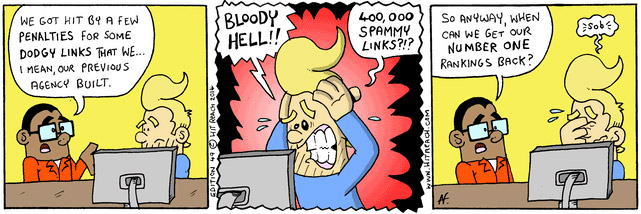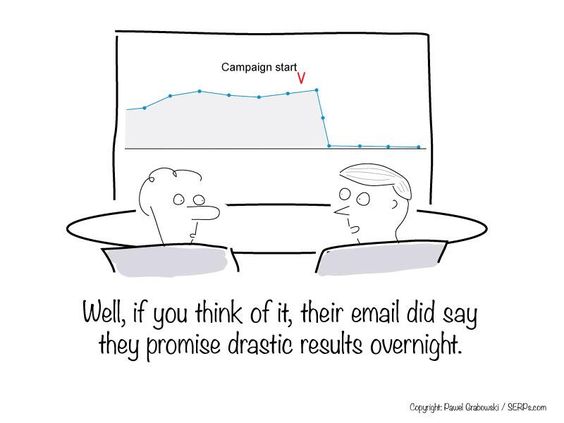Who links to your website remains a critical factor for most search engines when deciding where you should rank in their search results. Here's how to do it right.
How search engines see links
Every link to your website passes on what is known as link juice unless the webmaster of the site with the link has marked it 'no follow' in their code. 'No follow doesn't tell search engines not to follow the link (they will), it tells them no link juice should follow the link.
How much link juice flows depends on a number of factors:
- Is the link from a website/page with related content?
- Is the website/page that is linking to you popular in its own right ... what sort of links do they have?
- Is the content of the website/page linking to you good quality? Factors can include:
- Word count - an 8,000 word article on, for example, 'cats' suggests higher quality and depth than a 500 word one.
- Latent Symantic Analysis - does the article regularly use words related to cats like 'felines', a greater breadth of language suggests a greater quality.
- Related Words Analysis - compared to websites that currently rank highly does this content contain words you would expect to find - 'paws','fur','coat','tail','claws', etc.
- Shingles Analysis - if we break the text down into fragments, substitute words here and there and compare it with other websites is this content that has been copied or spun from somewhere else.
- Is the link to your website within the content of the page? - i.e. not in a list of links somewhere off to the side or bottom
- How many other links are there on that page? - because link juice gets shared out
- How close to the top of the content of the page is the link - because links closer to the top get a larger share of the link juice
The links you have and the link juice they send are known as your link profile and they define how much authority your website has.
Remember this is a mix of signals in use. If your kitten related website got a link form a page which didn't contain much more than an image of a cat does that mean no link juice? No, content can be thin if other factors exist such as it having a solid link profile or other positive user behaviour metrics.
Toxic link juice
Not all link juice is good to have. If you have a number of links to your site coming from low quality websites with thin content and they are only getting links from other low quality websites with thin content then a pattern emerges. You are probably trying to game the search engines.

99% of the time search engines like Google will just ignore your links - they remain there but the search engine won't acknowledge any link juice is flowing.
Occassionally though, when they feel you have been up to no good actively buying these links to manipulate your rankings in the search results, they will ban you from their index. That becomes the moment when link juice turns toxic
Black Hat SEO link building is all about paying for links and trying to persuade the search engines that you didn't. Each time search engines catch up with their latest scheme many links turn toxic and thousands of webmasters, in one foul swoop, lose their rankings. Ouch!
Buying links usually works in the short to medium term, the problems only come later when search engines catch up with the scheme and suspect you were a proactive participant. They are never worth the trouble the cause no matter how tempted or desperate you are to get some links 'right now'

Clean link building

General Rule of Thumb: If a link is easy to get or if anyone can get that link then it will be of no value and pass no link juice in the eyes of search engines.
So here are a few ways you can create targeted links:
- Genuine article sites like Wikipedia - you can add a link on Wikipedia yourself but beware it will be deleted in no time unless it is a genuinely useful link to genuinely useful information. Despite a mantra that 'Article sites are dead' there are many like Wikipedia that are alive and well. Most mark their links 'no follow' but you would be daft to think search engines ignore the fact that a hand edited site like Wikipedia links to you!
- Genuine hand edited directories like Yellow Pages. - again usually marked 'no follow' or recognised by the search engines as directories but if you are able to get a link from a hand edited site it counts a little.
- Broken link building - find websites with broken links to websites like yours and offer the owner your page as a suitable alternative. They get a repaired website and you get a link!
- Replacement link building - find websites which link to content which is out of date and offer the webmaster your page instead as a better alternative.
- Media assistance sites like Help a Reporter Out - if you can give a reporter the information they need they'll quote you and from time to time give a link to your website/page in their story.
- Ask for your product/service/content to be reviewed - but only by someone who counts in your subject area and be prepared for them not to shower praise on you through the whole review. Avoid websites that are made up completely of reviews - search engines can see them for what they are.
- Offer to guest blog/write a guest column - but only on websites you and others truly respect. Sites made up completely of guest blogs and where the other blogs are of shallow content are easily spotted and discounted by search engines.
- Ask to be added to a list - say, for example, you have just created a great JQuery slide show plugin. Contact those top ranking sites that have posts such as "20 amazing JQuery slide shows" ... there's no harm asking!
- The Skyscraper technique - look at the links your competitors have and consider if you could get the same links (and perhaps even get their links removed). If someone contacts me about a link I have and offers me better content I change the link or add an additional link. It adds value to my visitors so it is a win-win.
Now if you think about it all these ways to link build and get links that count are going to take alot of time. You can guest blog on twenty sites that accepts rubbish and will link to anything but links there will count for next to nothing. Chances are those twenty sites will eventually get penalized by the search engines for having unnatural outbound links or just for containing verbal vomit. Then the links will dissappear.
While those sites are going up in smoke the search engines will also spot the links to you and you might end up with a penalty of your own for unnatural inbound links.
So the long and short of it is to link build very, very selectively if you need to in order to get you started. After that spend your time on new content or making the old content even better by analysing your user behabviour.
Indirect SEO
The second type of links you can go for are ones that won't change the Authority of your website in the eyes of search engines but will bring you visitors. If your content is top notch grade some of these visitors will create links to it that will count. Its what I call 'indirect SEO' - the activity itself is not about directly achieving a link but may lead to links in other ways.
- Social Media - if you have followers let them know or try and persuade influencers with large followings to share your work.
- Social Media Communities - join related communities on platforms like Facebook and LinkedIn and post your content there.
- Get on forums - become a respectable member of a respectable forum. If people like what you say they will beat a path to your door.
- Blog comment - on respectable blogs, news and article sites and in a constructive way. No one follows a link on a blog comment unless it has a context. Say something of substance that attracts people to click the link and you will get visitors.
- Advertise - Google Adwords, OutBrain and a hundred other platforms exist out there if you are prepared to Pay Per Click or Pay Per Impression
- Submit your content to the discussion boards like inbound, Digg or Reddit - if it gets a conversation going the discussion will rank and some of those visitors will head over to see why your content has created so much buzz.
- Email marketing - if you have some traffic try building up a list of newsletter subscribers so you can get the message about new content out there and earning links fast. If not reach out to someone who does have a newsletter in your field and try and persuade them to give you a mention
Professional Link Builders
Long, long gone are the days where you would hire a company to make you 1,000 links, 400 blog comments, 400 forum posts, 25 articles, etc. Such activity is a red cloth to a bull and literally asking for your website to be banned from the major search engines.
Modern (and clean) link builders may spend a week, or even a month, to create one link and cost anything from a thousand dollars up but if that one link is on a top quality website it will work wonders for your rankings.
Really professional link builders are more like PR companies these days. They're just trying to say to the major online players "Hey, did you know about this content over here" and hope the reply they get is "No we didn't, its great, we'll reference it in something we write about" or "Crikey, that's much better than something we're currently linking to, we'll change the link".
Their true value is often in their network of contacts - they can look at contact and say "I know someone who would like to mention that".




